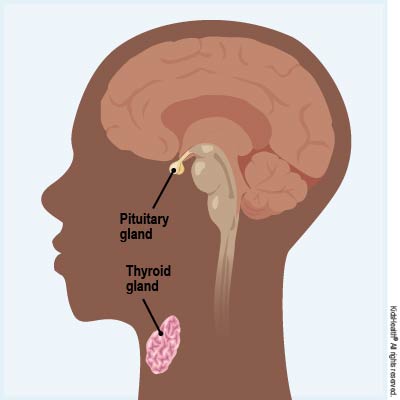Thyroid Cancer
Article Translations: (Spanish)
What Is Thyroid Cancer?
Thyroid cancer is a type of cancer that starts in the thyroid. The thyroid is a butterfly-shaped gland in the front of the neck. The thyroid and the hormones it makes are important for growth, development, and metabolism.
Thyroid cancer is uncommon in children. Most children with thyroid cancer do well with treatment.

What Are the Types of Thyroid Cancer?
The kinds of thyroid cancer that kids and teens can develop include:
Papillary (PAH-puh-lair-ee): This is the most common kind of thyroid cancer in children. It begins in cells that make thyroid hormones containing iodine. This kind of cancer grows very slowly, but can spread to the lymph nodes in the neck and, rarely, other parts of the body. Papillary cancer is more common in teen girls than boys.
Follicular (fuh-LIK-yuh-ler): This cancer also begins in thyroid hormone-producing cells. It's less common than papillary cancer, but more likely to spread to other parts of the body.
Medullary (med-uh-LAIR-ee): This rare cancer begins in cells that make calcitonin, a hormone that helps control calcium in the blood. This type of cancer usually runs in families.
What Are the Signs & Symptoms of Thyroid Cancer?
Often, thyroid cancer won't cause any symptoms early on. A doctor or parent might feel a lump in the neck, also called a nodule. As the cancer grows, it can cause:
- neck swelling
- hoarseness
- trouble swallowing
- swollen lymph nodes (swollen glands) in the neck
Who Gets Thyroid Cancer?
Children who have been treated with radiation, usually from previous treatment for head and neck cancer, are more likely to get thyroid cancer. Other things that can raise a person's risk include:
- autoimmune thyroid disease (such as Hashimoto's thyroiditis)
- a family history of thyroid cancer
- genetic diseases associated with cancers
How Is Thyroid Cancer Diagnosed?
Doctors may suspect thyroid cancer when they feel a lump in the neck. Doctors — including endocrinologists (hormone doctors), radiologists, and surgeons — work together to make the diagnosis. Then, they will create a care plan that's right for the child.
They will order blood tests to see how the thyroid is working. They'll do an ultrasound of the neck and thyroid to check for a nodule. The ultrasound can:
- Check the number of nodules and their sizes.
- See if a nodule is solid or filled with fluid (a cyst) and if there are other features that look like cancer.
- See if cancer has spread to lymph nodes.
Fine-needle aspiration biopsy is the best way to diagnose thyroid cancer. To do this, the doctor uses ultrasound to find the thyroid nodule. After numbing the skin with medicine, the doctor puts a thin needle through the skin into the nodule and takes a sample. The sample goes to a lab to see if it is cancer.
How Is Thyroid Cancer Treated?
To treat thyroid cancer, an ear, nose, and throat (ENT) surgeon will remove part or all of the thyroid gland.
After thyroid surgery, children may need to take thyroid hormone pills. These replace the hormones the body can't make without the thyroid gland.
Doctors may recommend a radioactive iodine scan and therapy to destroy any remaining thyroid cells after the surgery.
What Else Should I Know?
Most thyroid nodules are not cancer. If your child has a nodule, the doctor will do regular thyroid exams and ultrasounds to check its size. If the nodule changes, the doctor might recommend fine-needle aspiration biopsy to learn more.
Thyroid cancers are uncommon in children. But if your child has a thyroid nodule, it's a good idea to meet with a team of doctors who have experience caring for children with thyroid cancer.
Note: All information is for educational purposes only. For specific medical advice, diagnoses, and treatment, consult your doctor.
© 1995-2024 KidsHealth ® All rights reserved. Images provided by iStock, Getty Images, Corbis, Veer, Science Photo Library, Science Source Images, Shutterstock, and Clipart.com

